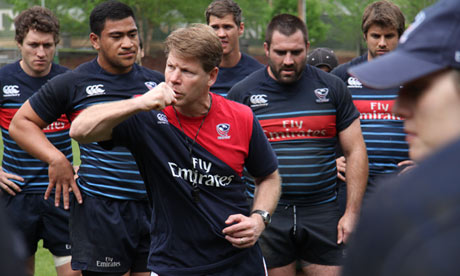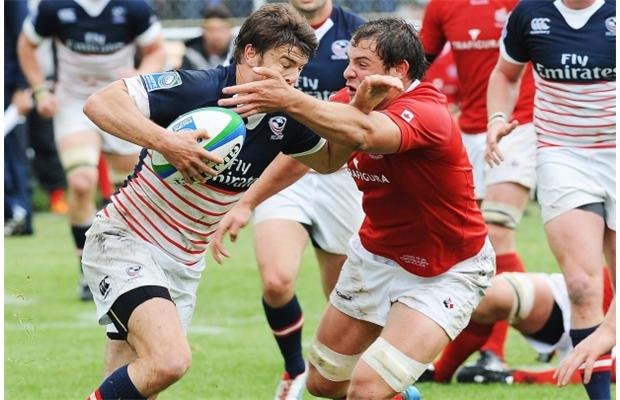Take the jump to read more.
As expected, the Eagles started out with a load of energy and took it to Ireland early. But five minutes into the match it was apparent that the Irish scrum would have the advantage of the U.S. Those difficulties led to the first points in the match after Eric Fry was penalized, leading to Madigan slotting the first of his penalties. Ireland led 3-0 with roughly ten minutes gone. Throughout the first ten minutes the U.S. had difficulty getting out of their own half as Ireland did their best to slow the match, which was their game plan heading in.
The U.S. and Ireland continued to play even as both teams disrupted each others set pieces, especially in the lineout. The first big hit of the match came from Samu Manoa who absolutely leveled an Irish player. Overall, Manoa played well in his first match for the Eagles in a few years. He was active on the offensive end with some nice runs and brought his typical play on defense.
Despite being pushed back from the U.S., Ireland took a 6-0 lead after Madigan hit another penalty 17 minutes in. For their part the U.S. tried to get their offense going but Ireland did a good job of coming up quickly and disrupting the Eagles. One of the best movements from the Eagles cam just a few minutes after the penalty when they worked their way down the field but a knock-on from Seamus Kelly stopped the momentum.
Throughout the first half the U.S. were continually left bewildered by referee Fredrico Pastrana but credit also should go to Ireland for doing exactly what they wanted to do in playing the referee in slowing down play.
The U.S. got their first break shortly after the 20th minute water break when Luke Hume chipped the ball over the Irish defense. The ball sat up just at the right moment allowing the U.S. to get deep into Irish territory. The U.S. kept trying to use their forwards to push through but couldn't. Fortunately for the Eagles referee Pastrana dinged Ireland with a penalty. Chris Wyles nailed the penalty to cut the lead in half with 25 minutes gone. However, the momentum didn't last long as Madigan hit a penalty to bring the lead to 9-3 with 30 minutes gone.
But the U.S. went on the front foot once again. Some strong running from Samu Manoa once again led to an Irish penalty while Wyles converted. But like a broken record, Madigan responded to bring the lead to 12-6 just before halftime. It wasn't the greatest half from the U.S. but they did a good job of keeping Ireland out of the try zone and staying strong on offense.
The second half began with a great run from Todd Clever to stretch deep into Irish territory. But Ireland were able to turn the ball over and clear. One of the best aspects of the match from the Irish perspective was the ability to constantly hold the Eagles up. Several times this stopped positive momentum from the Eagles.
The game to a disciplinary turn 53 minutes into the match when Todd Clever was sent to the sin bin for an alleged tip tackle. From the replays it was clear that Devin Toner initially tried to pick up Clever before Clever turned the tables and set down Toner safely. Pastrana went to the TMO who declared that it was a tip tackle. Madigan hit the subsequent penalty to take the Ireland lead to 15-6 with 53 minutes played.
Despite being a man down it was the U.S. that managed to have more of the play. They stayed aggressive and managed to keep Ireland have having any possession. That aggression was rewarded four minutes into the card when Wyles hit a penalty to bring the score to 15-9. The U.S. continued to do a fine job of holding on with Clever in the bin.
The U.S. even had one of their best opportunities as a clever kick from Manoa found space in the Ireland space. Using all his speed Taku Ngwenya nearly chased the ball down. He couldn't get to it before Ireland but he did cause a knock-on and ran out time on Clever's card.
Ireland then committed another penalty which Wyles converted to bring the score to 15-12 with 15 minutes to play. The penalty occurred not far from the line and the U.S. could have gone for the try but elected to take the safe three points.
From then on out Ireland did a terrific job of wasting time. They were slow to approach every lineout and took their time in the scrum. Tactically, it was perfect execution on their part. Still, the U.S. had another opportunity with only minutes left in the match as Taku Ngwenya took a Ireland chip and ran into space, but he was judged to hold on. Ireland then played slow ball before kicking it out to end the match.
Much of the conversation surrounding the match will center on the performance of referee Frederico Pastrana, who was wildly inconsistent throughout the match and by his own admission missed many calls. While he was poor, he ultimately did not cost the U.S. the match. The Eagles needed a perfect match to win. There were too many small errors to get that done. Some of the calls in the scrum could have not been whistled but the U.S. still put themselves in a position for them to be called.
There were a lot of positives to take out of the match for the Eagles. Defensively there were very strong. It's always an accomplishment to keep a Tier I team out of the try zone and overall the Ireland offense was flustered by the Americans. The scrum was still dominated but when you look at if from where it was two years ago it is much improved. Losing by only three points is a positive as well.
It would have been nice to treat the record crowd to a win, but the U.S. will have to take the positives out of the match and focus on Tonga next week.
Ireland 15
Pen: Madigan 5 (5/6)
USA 12
Pen: Wyles (4/4)



Poor selections and substitutes hurt the Eagles. No natural 7 in the starters. Never bought on some fresh legs. Tolkin FAIL in my book.
ReplyDeleteTom, perhaps you would like to go into detail on your empirical and rather unfounded observations of the match? Are there some other professional players that Curtis doesn't know about that are ready and willing to accept an Eagles selection? Is there an actual need for a "natural" 7 in the line-up?
DeleteThe Eagles played better in the second half than the first. With the exception of Hume's ankle, there was no real need to substitute anyone else. Fry figured out Kilcoyne's gamesmanship and was able to make his binds and control the bore once he determined and adjusted for the timing on Kilcoyne's bind prevention tactics. There was no real need to bring in fresh legs. The second half rhythm was good and fresh legs would not have helped. The Eagles outscored Ireland in the second half, maintained more possession in the second half than in the first, ventured into the Irish end of the pitch more in the second half, and scored on Ireland while Clever was in the bin.
Seriously, poor selections? Please enlighten the American rugby community who Tolks should have selected to win this match?
Now, if you want to use this match as an argument as to how important it is for the USA to create and support a professional rugby competition, that is a different story. Seven more professional rugby players on the US side in this match and it has a much different result.
As it stands, a team with eight professionals and many club players never allowed the Irish to control the match.
RE: SUBS
Delete1 - Tolkin is pioneering a throwback sub strategy where subs only come into the game when a player can no longer play. He would be the only international level coach deploying this substitute tactic.
2 - Tolkin has no confidence in the substitutes selected.
3 - Tolkin just forgot because his head was going to explode from being so far over his skis.
Use some deductive reasoning and figure to come to the conclusion that team selection was a problem.
Your declaration number 1 is the only one with which you supplied any warrant and even that is unsubstantiated.
DeleteI have interviewed and had discussions with Tolks on multiple occasions and have NEVER discerned a lack of confidence in any of his players. If he lacks confidence in someone, they do not make the squad - starters, reserves, or otherwise.
Number 3 is an ad hominem attack.
Yes, selections are a problem because we do not have enough US-eligible players who are playing professional rugby somewhere in the world and are available and willing to don an Eagles jersey. However, given the current available and willing player pool and the need to build a team that will qualify for RWC2015 this summer, I ask you, what players do you think he should have selected? The team that took the pitch against Ireland was one of the best and most experienced Eagles teams in recent history. This team prevented a Tier 1 team of professionals from crossing the in-goal line. When was the last time that the Eagles accomplished that feat?
Several players were invited to the camps and did not make the traveling squad. Is there someone that did not get picked that you think should have made the trip and why? Deductive reasoning requires information first. I, obviously, am ignorant of the information you possess and I respectfully request that you share it in this public forum.
It is with trepidation that I debate a man who doesn't understand or recognize sarcasm, but WTF.
DeleteFirst, coaches show confidence in their players by putting them on the field in pressure situation. Not by what they tell a blogger.
Second, I'll give the coaching staff the benefit of doubt and assume that the selected 23 were the best available players. The forwards on the bench should have been brought in to inject some pace and energy into the game on what was a very hot and humid energy sapping night. Not using them suggests either a lack of confidence or ignorance. I can see not making a substitution of your captain or in your 9/10 combination when they are clicking or one or more of your back 3 are having a blinder, but to leave tired forwards there when they are struggling in the scrum and you have a bench with 5 forwards just doesn't make sense. Some combination of Fenoglio, Thiel and Wallace should have been brought on as subs.
Lastly, if you're going to go with a 5 back row forwards strategy, which is almost what Tolkin selected, then you need to have at least one fetcher. It isn't clear what Tolkin's strategy was because the media seems to only ask open ended questions, but I would have gone with the following selection for the back 5 to start with noted tactical substitutions assuming no injuries.
4. Scott LaValla
5. Louis Stanfill (Brian Doyle)
6. Todd Clever
7. Peter Dahl (John Quill)
8. Samu Manoa
NOTE: The number of professionals on the team is a red herring as Canada has pulled themselves up to 13th in the IRB World Rankings and are only 3.6 points away from breaking the top 10.